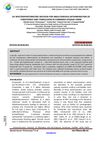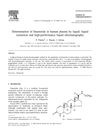 3 citations,
January 2000
3 citations,
January 2000 Some alternative therapies for vitiligo show promise but need more research.
 1 citations,
January 2015 in “Journal of Pigmentary Disorders”
1 citations,
January 2015 in “Journal of Pigmentary Disorders” Treating melasma in men is difficult, especially for the deeper skin layers, and may need more than just topical treatments.
 195 citations,
January 2008 in “Photochemistry and Photobiology”
195 citations,
January 2008 in “Photochemistry and Photobiology” Visible light can damage skin and most sunscreens don't block it well; more research is needed on its effects and protection methods.
 January 1998 in “Lasers in Surgery and Medicine”
January 1998 in “Lasers in Surgery and Medicine” Lasers are effective and safe for various medical treatments, including cancer, wound healing, and skin conditions.
 4 citations,
March 2006 in “Journal of renal nutrition”
4 citations,
March 2006 in “Journal of renal nutrition” Dialysis patients benefit from water-soluble vitamins but need careful management to avoid risks.
 3 citations,
January 2011
3 citations,
January 2011 The method measures finasteride accurately and cheaply using UV light.
 2 citations,
August 2019 in “International Journal of Applied Pharmaceutics”
2 citations,
August 2019 in “International Journal of Applied Pharmaceutics” Niosomes can effectively deliver Superoxide Dismutase to hair follicles, potentially helping prevent hair loss.

Drinking sweetened tea and poor sleep habits may increase the risk of hair loss in women.

Drinking sweetened tea and poor sleep increase the risk of hair loss in women.

Drinking sweetened tea and poor sleep habits increase the risk of hair loss in women.

Drinking sweetened tea and late bedtimes increase the risk of hair loss in women.

Drinking sweetened tea and late bedtimes increase the risk of hair loss in women.

Human hair keratins can self-assemble and support cell growth, useful for biomedical applications.
 108 citations,
December 2003 in “Lasers in surgery and medicine”
108 citations,
December 2003 in “Lasers in surgery and medicine” ICG-enhanced NIR laser therapy may be a promising acne treatment with improvement and no side effects.
 33 citations,
May 2013 in “Andrologia”
33 citations,
May 2013 in “Andrologia” Some herbs show promise as antiandrogenic agents.
 17 citations,
December 2015 in “International Journal of Cosmetic Science”
17 citations,
December 2015 in “International Journal of Cosmetic Science” Visible light can improve skin disorders and hair loss, but more research is needed to understand long-term effects.
![Synthesis and Activity of 8-Substituted Benzo[c]quinolizin-3-ones as Dual Inhibitors of Human 5α-Reductases 1 and 2](/images/research/efc54340-66d6-4f27-9930-045ac023f903/small/15248.jpg) 9 citations,
November 2004 in “Bioorganic & Medicinal Chemistry Letters”
9 citations,
November 2004 in “Bioorganic & Medicinal Chemistry Letters” New compounds were made that effectively block enzymes related to prostate issues and hair loss.
 8 citations,
November 2020 in “Optics and Laser Technology”
8 citations,
November 2020 in “Optics and Laser Technology” LED light therapy is effective for skin and hair treatments but requires careful use to minimize risks.
 7 citations,
July 2018 in “International Journal of Applied Pharmaceutics”
7 citations,
July 2018 in “International Journal of Applied Pharmaceutics” Chitosan nanoparticles are promising for sustained caffeine delivery through the skin.
![Synthesis and In Vitro Study of 17β-[N-Ureylene-N,N′-Disubstituted]-4-Methyl-4-Aza-5α-Androstan-3-Ones as Selective Inhibitors of Type I 5α-Reductase](/images/research/d19df8a7-8de6-4430-8a0d-4ffa1f502985/small/15608.jpg) 5 citations,
February 1997 in “Bioorganic & Medicinal Chemistry”
5 citations,
February 1997 in “Bioorganic & Medicinal Chemistry” New compounds were made that effectively block a specific enzyme related to androgen conditions.
 2 citations,
January 2011
2 citations,
January 2011 Researchers developed a quick and accurate method to measure finasteride and tamsulosin in tablets.
 September 2023 in “Forum Dermatologicum”
September 2023 in “Forum Dermatologicum” Various treatments for common hair loss in men and women are effective, but should be tailored to individual needs and potential side effects.
96 citations,
April 2017 in “Oncotarget” Smaller nanoemulsions can penetrate skin and hair follicles better, which may be useful for delivering drugs and vaccines through the skin.
 28 citations,
April 2023 in “Stem cell research & therapy”
28 citations,
April 2023 in “Stem cell research & therapy” Tiny vesicles from stem cells could be a new treatment for healing wounds.
 January 2023 in “Dermatologic Therapy”
January 2023 in “Dermatologic Therapy” A new hand-held light therapy device was found to be safe and effective for treating mild-to-moderate acne.
 21 citations,
May 2022 in “Frontiers in Cell and Developmental Biology”
21 citations,
May 2022 in “Frontiers in Cell and Developmental Biology” Hair growth and health are influenced by factors like age, environment, and nutrition, and are controlled by various molecular pathways. Red light can promote hair growth, and understanding these processes can help treat hair-related diseases.

The new gel with Zinc Oxide nanoparticles and finasteride shows promise for treating hair loss when applied to the skin.

Wild African goats have genetic adaptations for surviving harsh desert conditions.
 426 citations,
August 2014 in “Nature Medicine”
426 citations,
August 2014 in “Nature Medicine” Skin stem cells interacting with their environment is crucial for maintaining and regenerating skin and hair, and understanding this can help develop new treatments for skin and hair disorders.
 24 citations,
February 2000 in “Journal of Chromatography B: Biomedical Sciences and Applications”
24 citations,
February 2000 in “Journal of Chromatography B: Biomedical Sciences and Applications” Valid method measures finasteride in plasma, simple, fast, and affordable.

















![Synthesis and Activity of 8-Substituted Benzo[c]quinolizin-3-ones as Dual Inhibitors of Human 5α-Reductases 1 and 2](/images/research/efc54340-66d6-4f27-9930-045ac023f903/small/15248.jpg)


![Synthesis and In Vitro Study of 17β-[N-Ureylene-N,N′-Disubstituted]-4-Methyl-4-Aza-5α-Androstan-3-Ones as Selective Inhibitors of Type I 5α-Reductase](/images/research/d19df8a7-8de6-4430-8a0d-4ffa1f502985/small/15608.jpg)








